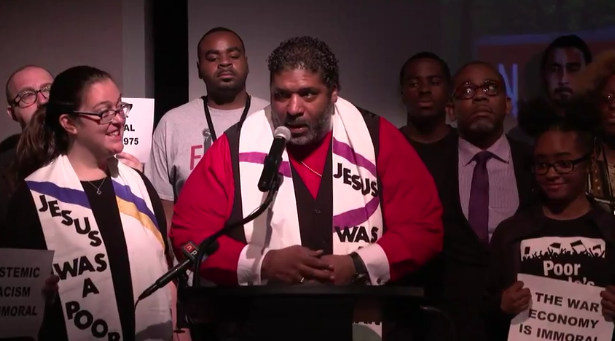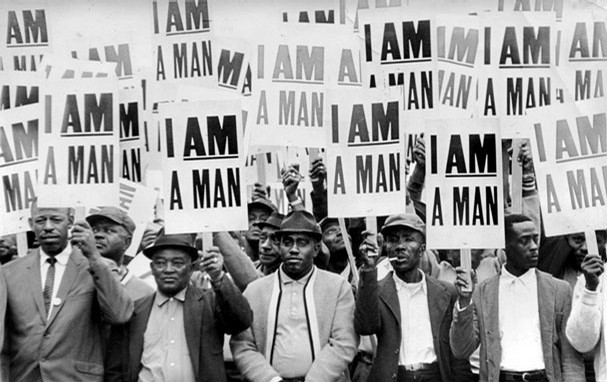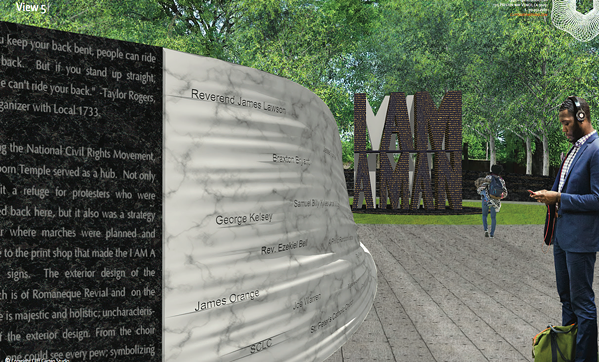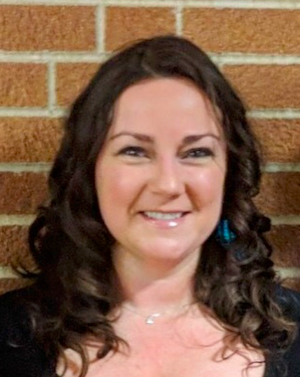Each week, the Flyer will feature adoptable dogs and cats from Memphis Animal Services. All photos are credited to Memphis Pets Alive. More pictures can be found on the Memphis Pets Alive Facebook page.

[slideshow-1]
Each week, the Flyer will feature adoptable dogs and cats from Memphis Animal Services. All photos are credited to Memphis Pets Alive. More pictures can be found on the Memphis Pets Alive Facebook page.

[slideshow-1]
MLK50: Morning Session (VIDEO)
Energy built around the National Civil Rights Museum as the MLK50 event gathered steam Wednesday morning.
The Memphis Flyer will have coverage of more formal events planned for the afternoon and evening.

Race to the Bottom
A recent tweet by FCC Commissioner Jessica Rosenworcel argues against policy rulings custom built to enable the Sinclair Broadcast group’s $3.9 billion acquisition of Tribune media. The move she criticizes would transfer ownership of WREG Memphis and push the overtly Conservative company’s local market reach well past what’s previously been allowed. Rosenworcel’s comments were inspired, in part, by President Donald Trump’s apparent endorsement of Sinclair over “fake news” media like “CNN, NBC, ABC & CBS.”
As I have said before, there is a troubling pattern at the @FCC. The agency’s big media policy decisions all seem custom-built for the business plan of Sinclair Broadcasting.
This is not right. https://t.co/vEhh9zVXKL
— Jessica Rosenworcel (@JRosenworcel) April 3, 2018
Will WREG dodge the Sinclair bullet? FCC commissioner criticizes policy decisions.
What makes Trump’s endorsement especially troublesome — even for him — is the fact that Sinclair’s stations operate unbranded and so, by way of affiliation, these Sinclair stations the President endorses often are the same NBC, ABC, CBS stations he also criticizes. And sometimes Fox stations as well.
Welcome to the media ownership funhouse.
Sinclair has been collecting network affiliated stations in an environment where cable news gets all the attention even though local TV news has more reach than all four major cable news stations combined
Via Common Dreams:
“Critics, including Rosenworcel, are concerned that under Chairman Ajit Pai, who Trump appointed last year, the FCC is moving deliberately to allow the Sinclair-Tribune merger to go through. Known for pushing right-wing viewpoints within the stations it already owns, the broadcaster drew ire this week after a viral video showed how local anchors nationwide are forced to read the same pre-packaged scripts.”
Will WREG dodge the Sinclair bullet? FCC commissioner criticizes policy decisions. (2)
When the FCC cleared a path for Sinclair’s acquisition in May it was widely assumed that the deal would go through quickly, but that hasn’t been the case. Delays have resulted from ongoing wrangling with antitrust officials in the Justice Department and the FCC’s internal investigation into decisions made by FCC Chairman Ajit Pai, and “whether there had been [FCC] coordination with [Sinclair].”

Proposals for a strategic plan to improve public libraries in Memphis will be accepted through the end of April.
The Memphis Public Libraries (MPL) is accepting request for proposals (RFP) for a strategic plan that will help library leadership better serve the “evolving” needs of customers.
“We are proud to bring private support to the Memphis Public Libraries,” Diane Jalfon, Memphis Library Foundation executive director said. “While the city Of Memphis annual budget covers facilities and staffing, with a small allocation for materials, the Foundation raises private funds to fill the gap and provide critical library enhancements.”
The last time the libraries used a strategic plan was in 2013. As a result, $1.4 million went to the library’s collection budget. The plan also led to the establishment of the Division of Library Services, as well as a redesigned web experience, technology improvements, enhancements to facilities, an increase in library staffing, and extended facility hours.
Strategic plans should focus on outreach, teen services, digital enhancements, and community awareness. Requests can be submitted here through the end of the month.

Revs. Dr. William Barber II and Dr. Liz Theoharis
A movement to “reignite” Dr. Martin Luther King Jr.’s efforts to fight poverty was announced here Tuesday by leaders of the new Poor People’s Campaign.
Revs. Dr. William Barber II and Dr. Liz Theoharis, co-chairs of the Poor People’s Campaign: A National Call for Moral Review detailed a plan to revive the campaign King was leading at the time of his death.
The first piece of the campaign will be a national press briefing on April 10th, at which a study on poverty will be released, as well as the moral demands of the movement.
Then, beginning May 14th, 40 days of direct nonviolent action is slated to take place in Washington D.C. and at least 30 other states around the country. Theoharis said the movement will be a “season of organizing and coming together across all lines that divide us” in order to “break through the noise of the current political system.” The 40 days of action will continue through June, ahead of a “mass mobilization” at the U.S. Capitol.
The actions will challenge the “interlocking injustices” of systematic racism, poverty, the war economy, environmental devastation, and the nation’s “distorted morality.”
[pullquote-1]
The overall aim of the new Poor People’s Campaign is to “unite the poor, disenfranchised, and marginalized across the country in an effort to transform the political, economic, and moral structures of society and to save America’s soul.”
“The reality is since the first Poor People’s Campaign, the issues of poverty and war and systemic racism have taken a side seat and we are rising up from the bottom to challenge that to save the soul of this nation,” Barber said.
Barber said that the conditions that motivated the 1968 Poor People’s Campaign have only worsened, as today 41 million Americans are living in poverty. The campaign will challenge the notion that the poor are poor because of personal failure, rather than flaws in the system, Barber said.
“People are coming together to shift the moral narrative so that we can shift the moral agenda,” Barber said. “ We are not trying to be on the left or the right; we are standing in the moral center.”
 Google Maps
Google Maps
Downtown Memphis Commission (DMC) president Jennifer Oswalt said in a Tuesday statement that she hopes to “find a solution that works for all” on the recent eviction of Downtown artists from their home of 25 years.
While Chris Reyes and Sarah Fleming have begun packing up their belongings from their longtime home at 1 S. Main, Tuesday’s statement from Oswalt shows further relief on the situation could be ahead.
Here’s Oswalt’s full statement posted to the DMC Facebook page on Tuesday:  DMC
DMC
Oswalt
“Some of our online community may be aware of the conflict regarding Downtown residents Chris Reyes and Sarah Fleming.
Christopher Reyes and Sarah Fleming are an integral part of what makes Downtown Memphis what it is: interesting, colorful, engaging. Their creativity and dedication to this city and Downtown Memphis deserve to be heralded.
The Downtown Memphis Commission has a long history of collaborating with Chris and Sarah on multiple projects and supporting their work in Downtown. We believe their contributions have made Downtown better.
The investors who purchased the Madison Hotel were no doubt attracted to the neighborhood in part because of its authentic Memphis vibe, a vibe that Chris and Sarah helped create.
We believe in a Downtown Memphis that includes Chris and Sarah. And we have never stopped looking for ways to help make that happen. We are a community of creatives, artists, musicians, and makers. This creative heritage is what gives Memphis its very soul and authenticity. And we work every day to preserve it.
[pullquote-1] We have expressed our concerns to the stakeholders of 1 S. Main LLC and hope that our appeal and those from other community leaders will help them to want to find a solution that works for all.
The Downtown Memphis Commission was created to develop Downtown for the betterment of the entire region and is tasked with increasing population and property values in our core city.
It isn’t always an easy or straight-forward job, but we work every day to preserve what is good and great in our city and to nurture what can be even better.
—Jennifer Oswalt, Downtown Memphis Commission”

This week is no ordinary week in Memphis. It’s the week that thousands are slated to visit the city to commemorate the 50th anniversary of Dr. Martin Luther King Jr.’s death.
From marches to concerts, there are a slew of events planned across the city this week. Here is a small sampling:
Tuesday
10:50 a.m. Parkland shooting survivor honoring MLK
At Mason Temple, survivor of the February school shooting in Parkland, Fla., Mei-Ling Ho-Shing, along with the president of the American Federation of Teachers Randi Weingarten will discuss how King’s ideas have inspired a nationwide movement in the wake of the Parkland incident.
7 p.m “Mountaintop” speech commemoration at Mason Temple
King’s surviving children, faith leaders, and civil rights activists will celebrate King’s last speech with prayer and a call to action to continue King’s unfinished work of fighting prejudice and poverty, while advancing the freedoms of all people.

Wednesday
8 a.m. ‘I AM A MAN’ photo reenactment
Organized by the Withers Collection Museum and Gallery, the photo reenactment is meant to honor King and the sanitation workers who marched during the 1968 strike. Line-up for the photo will begin at Fourth and Beale near the Withers Gallery. The photo is be shot from a helicopter by Eboni Bullard, the granddaughter of the original photographer Ernest Withers.
The photo will be displayed at the Withers Gallery, as well as at the end of “’68 I AM A MAN,” a film produced by Southern Tales Entertainment.
9:30 a.m. Rally, march honoring 1968 sanitation workers
Beginning on the steps of the American Federation of State, County, and Municipal Employees’ (AFSCME) local headquarters, activists will rally before marching to Mason Temple for music performances and speeches from Revs. Jesse Jackson and Al Sharpton.

10 a.m. Daylong tributes
Musical, dance, and spoken word performances, as well as speeches by civil rights leaders will run for most of the day in the National Civil Rights Museum courtyard.
3:30 p.m. Official 50th anniversary ceremony
The official remembrance ceremony will take place in the museum courtyard with the laying of the wreath at the Lorraine Motel, ecumenical liturgy, and additional remarks from civil rights players.
6:01 p.m. Bell Toll
At the exact time King was shot, bells across the country are slated to ring 39 times to honor each year of King’s life.

Thursday
11:30 a.m. ‘I AM A MAN’ Plaza dedication
The city of Memphis will dedicate a new art installation near Clayborn Temple honoring the 1968 sanitation workers in the context of the Civil Rights Movement.
There will be live performances, food trucks, and speakers.
See a comprehensive list of events on the NCRM website.
Today’s MVM celebrates our city’s outsized musical impact.

Memphis is only a city of a million people, but when it comes to music, we punch much higher than our weight class. From Aretha Franklin to Elvis to Juicy J., expat Memphians have enriched the music scenes wherever they go. One of our latest exports is Lanita Smith, a Memphis-raised singer who is currently residing in Los Angeles. Smith, who started out singing in Memphis churches, was picked by legendary producer Don Was for the Guitar Center Singer/Songwriter award, and has appeared on Jimmy Kimmel’s late night show.
This video, the second for her song “Love Can Do”, was created by Los Angeles choreographer Liezel Marie and director David Yanez with Wise Owl Media Group. It’s a buoyant and uplifting pean to diversity that we all need as we start out MLK50 week in the Bluff City. Enjoy!
Music Video Monday: Lanita Smith
If you would like to see your music video featured on Music Video Monday, email cmccoy@memphisflyer.com
 Memphis Farmers Market instagram
Memphis Farmers Market instagram
Rebecca Dull
The Memphis Farmers Market recently announced its latest director Rebecca Dull. She answered a few questions for us.
What are your qualifications?
I graduated from Southern Illinois University with a degree in Communications. Since then, I have volunteered with various nonprofits including Ten Thousand Villages of Austin, Public Relations Society of Austin, Keep Carbondale Beautiful, the Women’s Center, and more. Most recently, I was the Assistant Director of Carbondale Main Street, the downtown association. This experience will be relatable to my new position since I worked with small business owners and managed events.
First impressions of Memphis Farmers Market?
I’m thrilled to be a part of the Memphis Farmers Market, I’ve gotten to meet with our vendors and have been working closely with the board of directors. The downtown location is fantastic and I can’t wait to see the pavilion full of customers and vendors!
What are your plans/goals for the market?
I would like to continue to help small businesses grow while providing the community with access to fresh, healthy food at affordable prices. I’m hopeful to continue the tradition that the market is a place for community gathering and would like to partner with nonprofits and downtown restaurants and businesses.
One of the things you’re doing is changing the times. Opening at 8 a.m., instead of 7 a.m. What’s the reason behind this? Any pushback?
While I can’t take credit for the later hours, I can say I’m happy about it. The reason for this is that people just don’t come to the market that early. It was becoming too stressful for vendors and volunteers to be ready by 7am when guests and customers weren’t arriving much until after 8am. The response to this change has been overwhelmingly positive.
Are you working on anything that involves Memphians’ overall diet?
Memphis Farmers Market works with SNAP benefits and Fresh Savings to offer affordable fresh fruits and vegetables to customers with any budget. New this year, we’re able to accept Fresh Savings Rx vouchers for SNAP customers with diet related diseases or who are at risk for diet related diseases.
We’re also partnering with businesses like Raymond James who have health initiatives to bring our vendors in to speak with their employees about how to prepare and eat fruits and vegetables with specific health benefits.
The 2018 season opens April 7th.
I am a sportswriter. I’ve happily posted a “From My Seat” column for 16 years on the Flyer website (when I’m not occupying that space with thoughts via “Tiger Blue”). But I’m not only a sportswriter. So, in this space, I’m turning away from the games and athletes we love (or loathe), and sharing thoughts on a larger topic. Much larger.
April 4, 2018, is the most significant temporal marker for the city of Memphis since I moved here 27 years ago. A half-century is — by measures of a human lifetime — a significant sample size with which to analyze growth, development, progress. We find ourselves this week carefully analyzing, at least internally, the growth Memphis has realized since Martin Luther King was slain here on that dreadful day in April 1968.
My father was born in 1942 and grew up in a segregated Memphis. His black friends — some he grew to love — were primarily people employed by his parents, from housekeepers to auto mechanics. Dad crossed the state to attend the University of Tennessee in 1960, and I was born (in Knoxville) nine years later, precisely 11 months after Dr. King died in dad’s hometown.
Fast-forward 22 years. I moved to Memphis in 1991, 11 days before the National Civil Rights Museum opened on the site where King fell. This was pure coincidence, of course. I didn’t move here to be near the NCRM, and the museum’s founders didn’t wait for my arrival. But I’ve come to relish the completion of a Memphis family circle of sorts connected with the opening and rise of an institution dedicated to the promotion of worldwide diversity.
Memphis today, it must be noted, is not a colorblind city. Too many neighborhoods and schools remain one “color” or another; our public schools predominantly black and private schools predominantly white. But there are diamonds in the rough. My daughters have attended White Station High School, a public school more diverse than most of this country’s elite liberal-arts colleges. (I attended Tufts, and my firstborn is a freshman at Wesleyan.) Each of my daughters has sat in a classroom where she is a distinct minority, as measured by skin color, nation of origin, or religion. The Spartan softball team’s outfield in 2014 and 2015 could serve as a poster for the virtue of diversity in Memphis: a Caucasian in left, a Latina in center, an African American in right. (They won their district championship both years.)
My career has allowed me to interview the likes of James Lawson, Mike Cody, and Charlie Newman, men who quite literally walked with Martin Luther King, men who have continued his metaphorical march toward tolerance and brotherhood. More recently, for a leadership series I write for Inside Memphis Business, I’ve profiled Carolyn Hardy, Darrell Cobbins, Ruby Bright, and Tracy Hall. These are Memphis leaders, each improving the city with their voices and action. And we’ve reached a point, I believe, where they don’t have to be classified as black leaders, for they are leading us all.
It took too long and required too much debate, but statues celebrating the long-dead Confederacy were taken down last December. A white mayor helped spearhead their removal, a man elected in what is now a majority-black city. Societal progress must be measured over lengthy stretches of time — a half-century will do — but symbols matter, and the efforts on one winter night in 2017 made for a big gulp of progress in Memphis.
Which brings me back to who I am, 27 years after arriving in Memphis, 50 years after Dr. King gave his life for the cause of human growth. I am a sportswriter, indeed. I am a managing editor. More importantly, I am a husband and father. I am a friend to people as far away as Guam, family to people as far away as Seattle. I am a Vermonter (from days gone by but not so distant). I am a white man now living in a world where that adjective isn’t the tipping point it once was. And for that I’m grateful.
I am a Memphian.
Frank Murtaugh is managing editor for Memphis magazine, where he writes on a variety of topics.